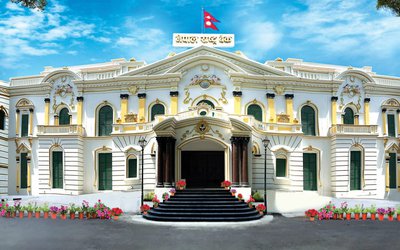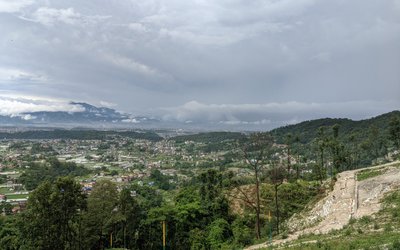
The petroleum crisis has become an annual ritual. International prices of petroleum products rise, petroleum import bills rise, oil funds come under pressure, and the government delays for some time. Then there is the inevitable rise in the price of petrol, diesel, kerosene, and cooking gas and aviation fuel. Recently, the Nepal Oil Corporation (NOC) has increased the price of petroleum products in less than two weeks as the price of petroleum in the international market has increased. The corporation has also increased the price of petrol, diesel, kerosene, aviation fuel etc. as well as LP gas. In Nepal, the corporation has increased the price of petrol, diesel and kerosene by Rs 3 per liter and gas by Rs 75 per cylinder.
Along with this, petrol price in Kathmandu Valley has reached Rs 136 per liter, diesel and kerosene Rs 119 per liter and LP gas cylinder used for cooking Rs 1575. Similarly, the price of domestic aviation fuel has also been increased by Rs 5 per liter. According to the increased price, the price of aviation fuel has now reached Rs 101.
The price of international aviation fuel has also been raised to 895 per kiloliter. The corporation has increased the price with effect from 12 noon on November 8. Nepal Oil Corporation has increased the price of petroleum products for the second time in the last 12 days. Earlier, the corporation had said that the 15-day deficit had reached Rs 2.22 billion as per the new price sent by the Indian Oil Corporation (IOC) on September 15. It had increased by Rs 50 per cylinder. The corporation has stated that the price has increased a little as the loss of the corporation will reach Rs 3.2 billion in 15 days if it is not adjusted according to the current price increase.
According to the price list sent by Indian Oil Corporation on November 3, the corporation received an average price of Rs 7.42 per liter for petrol, Rs 3.92 per liter for diesel, Rs 11.49 per liter for kerosene and Rs 4.11 per liter for aviation fuel. The corporation has stated that the price of LP gas has increased by Rs 246.97 per cylinder. According to the corporation, the price adjustment was made after the 15-day deficit exceeded Rs 3 billion (ie monthly average of Rs 6 billion) on the basis of the newly increased price.
As the impact of inflation extends to the production of goods and services, transportation and consumer prices, it is likely to increase the rate of inflation. This could make it difficult for the government to meet its inflation target of 6.5 percent this year.
Meanwhile, Akhil (Revolutionary) has demanded immediate withdrawal of price hike in petroleum products. Instead of providing relief to the people affected by the Covid pandemic, they have demanded the withdrawal of the price hike. The revolutionaries have strongly condemned the rise in prices and warned that if they do not withdraw, they will start a struggle. It has also appealed to the general public including students, parents, teachers, workers, farmers and youth to join the strong struggle against price rise.
In most of the countries, the price of petroleum products has been kept from a political point of view. It would not be an exaggeration to say that this has proved to be a different path in the chain of inflation as it has been deregulated over the last few years due to the provision of cross subsidy policy.
Although the government's job is not to trade and it is not obligated to sell its property to India at a high price and sell it cheaply, the government could have brought the price level to "at par" by deducting revenue equal to customs, but it did not do so.
The government has not been able to realize its social responsibility towards the people. The role of the government in the petroleum sector needs to be redefined and the market needs to be deregulated. But it does not seem that an environment has been created in which only the private sector can rely on sensitive items like petroleum products. Therefore, on the one hand, there is a need for corporations within government regulation, on the other hand, the private sector should be able to move forward with participation, no one should have a complete monopoly, but the private sector should be allowed to enter the petroleum business and be competitive and be guided by law.
In this context, the market for petroleum products is so sensitive that fluctuations in the international market price may not take long to make a profit or loss of crores. Nepali private sector entrepreneurs are not in a position to take this risk.
It is clear that in the absence of oil, the country's momentum will stabilize. Therefore, when the private sector is involved in sensitive matters, the private sector may act dynamically only at favorable times, but in adverse circumstances, the exact opposite can happen. Therefore, when the private sector has to be involved in petroleum products business, the corporation and the private sector should be given equal opportunity and even the corporation can compete only if it is given adequate storage capacity, regional infrastructure and reliable basis for investment.
The job of the government is only to play the role of facilitator by formulating appropriate policy and independent regulatory body should pay attention to price, quality service and other consumer interests.
However, in the current precarious situation in the country due to Covid, the poor people are being beaten from all sides. Oil Corporation of India (IOC) has been doing business by purchasing fuel. The IOC sends new price lists to the corporation on the 1st and 16th of the month on the basis of international price fluctuations.
On the basis of the same price, the corporation fixes the new price and fixes the retail price in the case of the consumer. It has adopted automatic pricing method or modality to adjust the international market price. The corporation had increased the price as the cost was not less than the cost price even though the international market price had decreased.
The corporation was even criticized at that time for saying that the price of Nepali market had gone up even when the price had gone down in the international market. The financial condition of the corporation is deteriorating due to continuous losses. International prices and domestic taxes and costs have pushed up the cost of the corporation, but the loss has been increasing when the fuel has to be sold at a price lower than the cost price. Consumers in Nepal are forced to pay exorbitant prices due to the tax burden on petroleum products.
The government has been collecting revenue under various headings on the basis of fuel prices. However, whether the revenue raised in this way has been utilized properly will be a matter of discussion. Alternative measures could have been taken to prevent the rise in the price of petroleum products, such as: when the price of diesel goes up, the overall freight goes up, and the cost and price of all sectors go up. Gas is connected to the kitchen of every household, it affects the kitchen of the poor, why not find an alternative way to increase the price? After the increase in consumption, the management cost per liter has to be reduced. What does the Oil Corporation do? What is the function of the Price Stabilization Fund? Why not use it? Shouldn't the tax levied by the government be reduced in such a short time? Why tax more than cost? Infrastructure tax is now removed, the money is not used.
Due to the rise in prices in the international market, the price of oil in the country has been adjusted automatically and the Oil Corporation has not had to incur financial losses in recent times.
It seems instead of gradually increasing the price of petroleum products, the Government of Nepal could have reduced its total consumption by adopting various energy saving or alternative measures. Rising oil prices in the Indian market, as Nepal- India border is open, it is not uncommon for oil to be exported to India no matter how effective the monitoring is for controlling theft. At the same time, it is necessary to pay equal attention to the distribution of quality petrol in Nepal as there is a large number of businessmen involved in this business who want to get rich quick by mixing cheap petroleum products with high priced petroleum products.
Is the grant a boon to the economy?
The latest proposal for oil price hike and its impact on the general price level, budget and balance of payments situation will come as a big blow to the Nepali people. It is clear that the proposed price increase will have a direct impact on the lower income group (LIG) rather than the middle income group (MIG) and higher income group (HIG) as the lower income group consumes more petroleum products and gas.
The prices of diesel, petrol and kerosene have gone up in the international market and neighboring India, especially the government, has also increased the prices of diesel, petrol and kerosene in Nepal. Fuel prices can have serious consequences in the face of changing environments and the impact of Covid. However, in the long run, subsidies are not a boon for the economy. Learning from history:
There is an interesting historical fact regarding subsidies and energy efficiency, which may be of interest to the Nepalese people as well. Just to repeat, once upon a time in 1970, there was a worldwide energy crisis due to rapid economic growth and rising fuel prices. It was also alleged that Saudi Arabia had increased fuel prices by reducing the supply of fuel to the market. Whatever the reason, the effect was more interesting than just the price increase. Here is the work done by the government and its effects. The UK government subsidized fuel costs. As a result, additional funding was needed for subsidies. This benefited their companies in POL products but had to cut back on social sector costs that affected people's daily lives. Companies never cared about its energy costs because they were getting cheaper so they were enjoying their growth. Similarly, Germany provided partially less grants than the UK and invested heavily in alternative energy sources such as windmills and small hydropower. The effect was almost the same as in Britain. Similarly, the United States announced aggressive research and development (R&D) to increase fuel efficiency and reduce fuel dependence, and invest more in nuclear energy, the market will play its part. Fuel prices rose after Japan imposed an import tax on petroleum products. All the economists were saying that the Japanese would be shattered in the next ten years. The people were against this move but the government did not back down. Companies began to do their own research to reduce dependence. The result is economic and Japanese and American of the eighties and nineties.
India's energy efficiency is now only 10 percent that of Japan. What could be the cause? Grants. And it shows that we are not moving towards subsidies. Nepal should also learn a lesson from this. In the current context of Nepal, on the one hand, the country's official inflation is projected at 6.5 percent and on the other hand, the government is in a dilemma to increase the price of oil due to the rise in international prices. Irrigation projects can be built in the country to help farmers with big money going abroad to buy POL products. But, what happens to those who can't meet their basic needs? Do you think it would be difficult for them to cook if the government did not provide subsidy for kerosene, LP gas and diesel? How can a 'New Nepal' or a “Prosperous Nepal” move forward by ignoring the poor, destitute and marginalized people of Nepal who have become a big part of the country for that?
As far as LPG is concerned, people are switching to LPG because of its cheapness and accessibility. This greatly reduced the country's use of primitive fuel. In short, the government should be careful and do its homework to determine the price of oil. Uncontrolled inflation has seriously affected the government and especially the people. Neighboring India has not seen a sudden rise in the price of petroleum products as the public has been warned enough to accept some adjustments by advertising and public relations. Nepal should also learn a lesson from this.
- 2082/83 Policy And Program: Presentation New, Short But Not Exciting
- May 07, 2025
- Nepal's Capital Market: Some Analysis
- May 02, 2025
- Nepal’s recent Economic Growth: Critical observations ?
- Apr 12, 2025
- “Kolahalko Kolaj “: A Collection Of Scattered Memories By Prakash Sayami
- Apr 02, 2025
- Nepal-India Trade, Transit And Unauthorized Trade: Some Considerations
- Jan 16, 2025
















